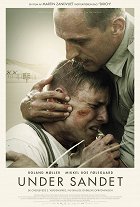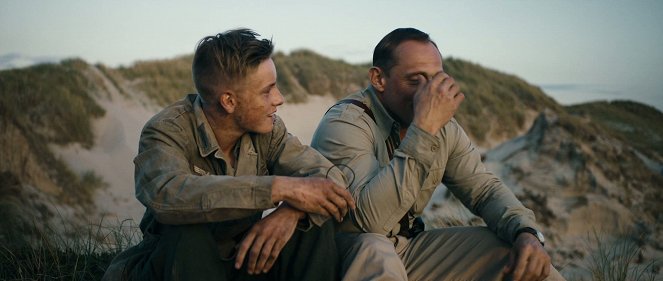Directed by:
Martin ZandvlietScreenplay:
Martin ZandvlietCinematography:
Camilla Hjelm KnudsenComposer:
Sune MartinCast:
Roland Møller, Louis Hofmann, Joel Basman, Mikkel Boe Følsgaard, Laura Bro, Zoe Zandvliet, Mads Riisom, Oskar Bökelmann, Emil Belton, Oskar Belton, Leon Seidel (more)VOD (3)
Plots(1)
The drama follows a group of captured soldiers in Denmark in the immediate aftermath of WWII. After the Nazi surrender in May 1945, a unit of young Germans – most barely out of their teens – are put to work by their Allied captors. With minimal training, they are placed under the supervision of a righteous and embittered Danish sergeant, Rasmussen (played by the superb Roland Møller, A Hijacking), and sent to locate and disarm Hitler's munitions that still litter the beaches along Denmark's west coast. Scornful of the Germans for their five-year occupation of his country, the sergeant marches the boys out to the pristine dunes each day to perform this risky task. Yet as the days advance and he gets to know his young charges, especially the protective and pragmatic Sebastian (Louis Hofmann), Rasmussen grows more and more conflicted in his feelings, when compassion is the last thing his superiors wish to see extended...Stories of conflict and its repercussions abound in cinema, but few have so eloquently focussed on the human connection between conflict's 'winners' and the vanquished, and the emotional impact of occupation and nationalism. (Madman Entertainment)
(more)Videos (7)
Reviews (6)
There are plenty of nations in Europe that could make dozens of films like Land of Mine. The Danes probably have a single theme, but not only will they film it, but they will film it consistently, distantly, and without artificial vicissitudes and pathos. The theme itself is exceptional, but Zandvliet can indeed get a consistently civil drama going in which broader questions of collective guilt and the legitimacy of revenge resonate. A mature, accurate and very elegantly filmed story about post-war explosive soil. I have respected Roland Møller for a long time, but here he demonstrates his undoubtedly most nuanced and sophisticated performance.
()
Great stuff and a different view of war. The film is about young German POWs who are tasked with clearing a minefield on a beach under the command of the brutal Roland Møller. It’s a powerful story with a very strong atmosphere and enough chilling scenes to keep the viewer's attention. 8.5/10.
()
War movies can still surprise me by their story. Under sandet is one of those surprises. It’s a story from Denmark about what happened after the end of WWII. I wouldn’t have thought that the Germans would be disarming anti-personnel mines on the beaches, just like I wouldn’t have thought that I’ll form any sort of connection with those 15-year-old German boys. But both ended up to be true and this has made the movie into an incredible experience. Plus, I’ll be sure to remember to be interested in Roland Møller’s movies in the future.
()
The Hurt Locker 1945. Tangible subliminal tension, the more minimalist the more consistent the study of characters in the point break situations (literally), no black-and-white moral questions of collective guilt (taking the skeletons out from the closets, kind of Danish equivalent of displacing German citizens in Czechoslovakia) and all this is topped by impressive subdued performances and unusually apt (and chilling!) musical undertone. It will squeeze emotions out of you through already in recent years trademark (hello Lindholm) Danish reserved approach in, which is delusive with its apparent Nordic coldness. However, the opposite is true, as it gets stuck under the skin more than anything else. Clearly the best (non)-war movie in recent years.
()
Following A War, this is another Danish drama about conflict continuing off the battlefield. However, don’t expect Land of Mine to have the same ability to examine a complex situation from multiple perspectives and the disturbing moral ambivalence as found in Lindholm’s film. The Germans’ point of view is given priority. From the start, we get to know the young German soldiers as anxious boys who want to survive and return home to their mothers. The film portrays them as innocent victims who must face the brutality of Allied officers, at least one of whom manages – for the sake of balancing forces – to find some humanity despite being characterised as (initially) hating Germans (though he loves his dog). No conflict between the film’s sub-worlds and micro-worlds (Germans against the sergeant, Germans among each other, the sergeant against his superiors) is omitted, and most of the motifs that you would expect after being briefly familiarised with the subject matter (inhumane treatment, the bond of brotherhood, the father figure, a child in peril) are present. What’s worse is their interconnectedness. The narrative piles up emotionally powerful moments that do not allow us to get to know the characters “at ease”, outside of extreme situations in which either life or nerves are at stake. The element of surprise in an otherwise predictable film is provided by the fact that a deadly explosion is a matter of a single wrong move, which Zandvliet puts to good use, though even that becomes somewhat predictable by the end of the film. Even without excessive sentimentality and exaggeration, Land of Mine tries too hard to be a moving humanistic drama that will appeal to an international audience and reinforce the belief that war is evil and should be banned in all cases. Unlike A War, this film does not ask the very difficult questions for which there are no clear answers. 70%
()



Ads